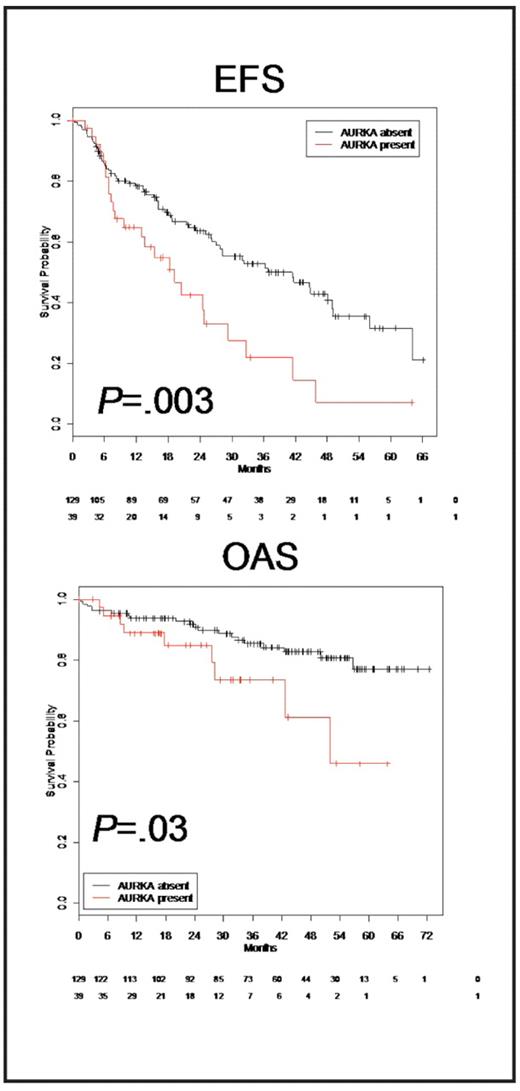Abstract
BACKGROUND. At the time of diagnosis, myeloma cells are characterized by a low proliferation rate that increases in relapse. Presence of proliferation correlates with adverse prognosis. At the same time, myeloma cells harbor a high median number of chromosomal aberrations, often associated with genetic instability. Cellular proliferation and genetic instability in turn have been associated with Aurora-kinase expression in several cancer entities, including multiple myeloma.
PATIENTS AND METHODS. Expression of Aurora-A, -B and -C was assessed using Affymetrix DNA-microarrays in 784 samples including two independent sets of 233 and 345 CD138-purified myeloma cells from previously untreated patients. Chromosomal aberrations were assessed by comprehensive iFISH using a set of probes for the chromosomal regions 1q21, 6q21, 8p21, 9q34, 11q23, 11q13, 13q14.3, 14q32, 15q22, 17p13, 19q13, 22q11, as well as the translocations t(4;14)(p16.3;q32.3) and t(11;14) (q13;q32.3). Proliferation of primary myeloma cells (n=67) was determined by propidium iodine staining. The effect of the clinical Aurora-kinase inhibitor VX680 on proliferation of 20 human myeloma cell lines and survival of 5 primary myeloma cell-samples was tested.
RESULTS. We found Aurora-A and -B to be expressed at varying frequencies in primary myeloma cells of different patient-cohorts, including 23% for Aurora A in our first cohort of patients treated with high dose therapy (see figure shown below). Aurora-C expression was found in testis-samples only. Myeloma cell-samples with detectable Aurora-A expression show a significantly higher proliferation rate, whereas the number of chromosomal aberrations (aneuploidy) is not higher compared to myeloma-cells with absent Aurora-A expression. The same holds true for subclonal aberrations (i.e. genetic instability). The Aurora-kinase inhibitor VX680 induces apoptosis in all myeloma cell lines and primary myeloma cell-samples tested. Presence of Aurora-A expression delineates significantly inferior event-free and overall survival in two independent cohorts of patients undergoing high-dose chemotherapy and autologous stem cell transplantation. This observation is independent of conventional prognostic factors, i.e. serum-ß2-microglobulin or ISS-stage.
CONCLUSION. Aurora-kinase inhibitors (including VX680 tested here) are very active on myeloma cell lines as well as primary myeloma cells and represent a promising weapon in the therapeutic arsenal against multiple myeloma. Gene expression profiling allows the assessment of Aurora-kinase expression and thus in turn a tailoring of treatment to patients expressing Aurora-A associated with adverse prognosis.
Disclosures: No relevant conflicts of interest to declare.
Author notes
Corresponding author


This feature is available to Subscribers Only
Sign In or Create an Account Close Modal